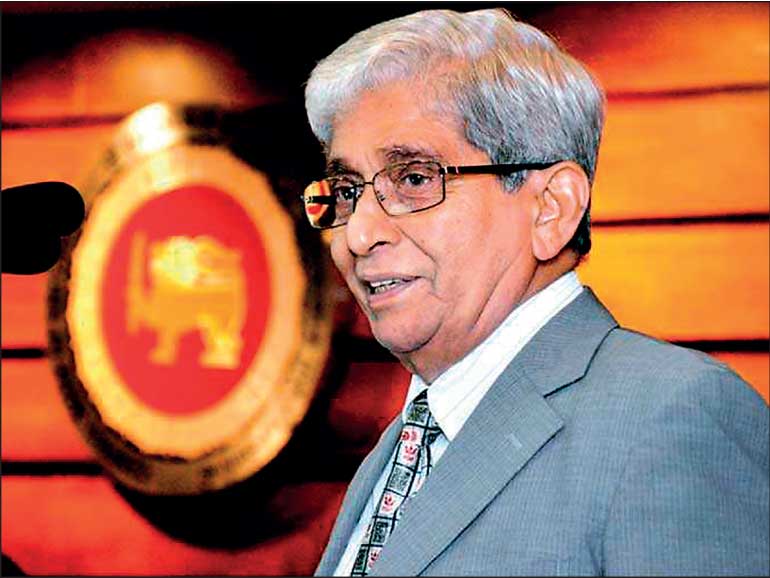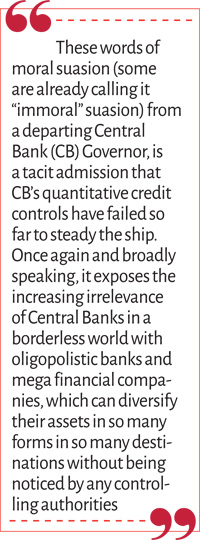Wednesday Feb 18, 2026
Wednesday Feb 18, 2026
Saturday, 11 September 2021 00:00 - - {{hitsCtrl.values.hits}}

Central Bank Governor W.D. Lakshman
 “As responsible members of the financial community of this country, I most categorically require and request your active and tangible cooperation in order to ensure that the exchange rate range of Rs. 200-203 per dollar, and correspondingly, to ensure that the rate does not deteriorate beyond this agreed rate range.”
“As responsible members of the financial community of this country, I most categorically require and request your active and tangible cooperation in order to ensure that the exchange rate range of Rs. 200-203 per dollar, and correspondingly, to ensure that the rate does not deteriorate beyond this agreed rate range.”
These words of moral suasion (some are already calling it “immoral” suasion) from a departing Central Bank (CB) Governor, is a tacit admission that CB’s quantitative credit controls have failed so far to steady the ship. Once again and broadly speaking, it exposes the increasing irrelevance of Central Banks in a borderless world with oligopolistic banks and mega financial companies, which can diversify their assets in so many forms in so many destinations without being noticed by any controlling authorities.
Be that as it may, there are three different exchange rates prevailing in locally at the moment: CB’s 200-203 rupees per dollar, commercial banks quotes between 225-235 rupees and black markets offer between 240-250 rupees. When the margin of difference among different rates is small CB’s moral suasion may have some bite, but when that margin is wide as it is now, it is the CB that would be forced to change its rate to reflect reality. Even if commercial banks reluctantly keep closer to CB’s recommended rate, black market will thrive with rates shooting even higher than 250 rupees. This is the dilemma that CB is facing now.
Earlier, when the Governor announced increasing the interest rate, several economists pointed out that it was too little and too late. Timing is the essence in these matters. Was that delay the fault of CB or necessitated by politics? Money market experts have been arguing for some time that CB had lost its independence to act neutrally and take action promptly, no sooner President GR handpicked its governor, appointed his henchmen/woman to the monetary board and virtually dictated to them to assist implementing HIS economic policies.
When a CB succumbs to political pressures, mortgages its independence and ignores the relevance of time factor in taking decisions, consequences would be serious. Political interference in the operation of economic institutions is one of the major problems contributing to current economic difficulties in the country. Technocrats are forced to obey presidential diktats.
At the same time, Governor Lakshman’s moral suasion also sounds like his adieus to local banking and financial institutions. Greek bond fame former Governor Nivard Cabraal is said to replace Lakshman even before the latter ends his two-year term. Lakshman’s departure appears to confirm the story circulating in political circles that Rajapaksas only give a two-year appointment to anyone outside their family. Is that the real reason or is he being booted out rather unceremoniously? Or is he going to be promoted to the World Bank in return for his loyalty to the regime?
However, given the parlous state of the economy, officially confirmed by the new Finance Minister in his maiden speech to the Parliament, the country requires more than a change in CB’s leadership. Leaving aside Cabraal’s manoeuvres for an attractive entitlement what on earth is he going to do which Lakshman could not?
The country’s economic woes have less to do with faulty monetary policies than with the entire economic strategy adopted by the current regime. Blunders on the fiscal side and policies on the run emerging out of thought bubbles have caused more damage to the economy than anything else. There would have been absolutely no need for a food emergency had the government dared to remove market rigidities right at the beginning. Political calculations rather than the economic future of the country prevented prompt action. The moment the pandemic started causing economic havoc the Government should have summoned the nation’s experts across different the political spectrum and created a taskforce to design a comprehensive plan with time frame to tackle the economy. Instead, the President depended on the so-called expertise of his viethmega, which is no more than a cabal of profiteers, bootlickers and opportunists.
Given the multipronged crisis facing the nation only a systemic change can bring any relief to the people, who have sacrificed much more than what they should have. Naturally, there is widespread anger within the populace, which the rulers are quite well aware of. This is why they have brought in the emergency rule rather surreptitiously to tackle re-emergence of public protests once the current lockdown is removed.
However, the real tragedy is the lack of any alternative program from the Opposition. Opposition politicians seem to be more interested in exploiting the prevailing dissatisfaction to outvote the Government at the next elections, if it were to be held, rather than to mobilise this dissatisfaction around a workable alternative program and bring about a regime change. The BBS is slowly raising its ugly head and warning anti-Government critics, including the Catholic Cardinal, not to disturb the false calm. How long will this drama continue?
(The writer is attached to the School of Business & Governance, Murdoch University, Western Australia)